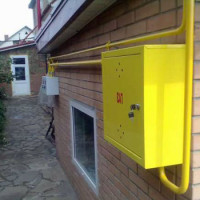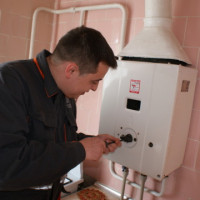Legal features of the installation of individual heat meters in an apartment building
Good afternoon, I would like to clarify the legal possibility of installing individual heat meters in an apartment building. Do I have the right to put a heat meter in my apartment if they are not installed in the whole house?
There are individual ones that stand on the landing locked. The Criminal Code takes readings themselves. All month the batteries were turned off, and the bill came huge. Will the Criminal Code accept these testimonies?
Visitors Comments
Add a comment
 How much does it cost to connect gas to a private house: the price of organizing gas supply
How much does it cost to connect gas to a private house: the price of organizing gas supply  The best washing machines with dryer: model rating and customer tips
The best washing machines with dryer: model rating and customer tips  What is the color temperature of light and the nuances of choosing the temperature of the lamps to suit your needs
What is the color temperature of light and the nuances of choosing the temperature of the lamps to suit your needs  Replacement of a geyser in an apartment: replacement paperwork + basic norms and requirements
Replacement of a geyser in an apartment: replacement paperwork + basic norms and requirements
Good afternoon. Let's first see if you confuse the definitions.
The common house meter for accounting for resource consumption determines the total amount of heat consumed by the MKD, including the premises that are in common ownership.
Individual metering devices control the consumption of resources in a particular room owned by the MKD tenant or private.
In this connection, I would like to receive more information, how are individual metering devices in the stairwell of your house connected with the account that you received? Payment is calculated individually by IP + account for general consumption.
It is strange that you ask about the possibility of installing IPUs and say that they are not installed in the whole house and then write that you have such devices on the cells. Either your question is whether it is possible to install it in the apartment, or whether you are confusing IPU with common houses.
Can you install an IPP at all:
1. P. 7, Art. 13 of the Law on Energy Saving states "MKD, put into operation after 11/27/2009, on the date of their commissioning should be equipped with natural gas IPPs (with reference to paragraph 5.1 of the same article)"
2. 23.10.2009, the Federal Law of the Russian Federation No. 261 obliges the owners of residential buildings of MKD to install metering devices for the resources that they consume. Among them, water supply and electricity are indicated and supplemented - “if the system allows, for heating”. And "MKD, put into operation from 01.01.2012 after major repairs, must be equipped with thermal energy control devices if they are technically possible to install."
The system may not allow because of the vertical wiring of the pipes of the heating system (although in this case you can install a switchgear and control the flow rate of your apartment on each radiator section), as well as due to other features of the arrangement of utility networks that are included in the draft technical passport for multi-unit at home.
As for the distributor, the system is not cheap, the calculations are complicated, they are installed quite rarely in the vertical. True, such a wiring is more present in old houses, modern ones are mainly equipped with horizontal wiring.
Also, the installation of counters may not be allowed there:
1. Where there is no access to regulatory control of accounting of consumed resources, in accordance with the legislation of the Russian Federation on ensuring the uniformity of measurements and technical regulation.
2. Where there are no conditions for the correct operation of the electric meter due to certain operating modes of the VIS, climatic conditions and so on.
Thus, we found out that yes, you can install the IPP if you are given technical capabilities and the Criminal Code cannot refuse you.
As for the obligations to install the meters exactly on the landing, the meter should be located in the place indicated in the design documentation. How this is done, we will consider in stages:
1. So, you insulated the apartment (because in non-insulated apartments it is sometimes even more profitable to pay for common house control rooms).
2. Get a meter that complies with all the rules and standards of the State Standard. Do not forget to take checks and a full package of documents on it.
3. Write a statement to the local CC. In it you ask to provide you with technical specifications for connecting meters for heating. Most likely, there will be a survey, including an apartment with a statement, one copy of which you take for yourself. If the Criminal Code has provided you with documents stating that there is no technical possibility, and you are sure of the opposite, you can apply for an independent examination and then draw up the Criminal Code a claim for an unjustified or unlawful refusal.
4. With these documents you go, or again to the Criminal Code or another office that has the appropriate license or rights to similar types of work, and draws up a project for the installation of a metering device for heat supplying resources. The project can also be an organization, in the role of which is your UK, that is, providing you with resources. This is where the main point “x” will be, where you will find out whether it is possible to install the meter in the apartment, according to all the technical capabilities.
5. Again, the organization with a license or CC, install the meter. Better than the Criminal Code, but they may not have a full-time employee with the appropriate clearance. Do not forget to draw up an acceptance certificate and a contract in 2 copies, one remains with you.
6. Then call or directly on the spot make an act of sealing. Sometimes, they are sealed immediately during installation, it depends on the level of specialists, and sometimes, you have to wait up to 30 days after the application for sealing. And immediately write an application for admission to operation. Do not forget that when admitting the device to operation, you must present to the inspector all the documents for the inspection and control, installation, etc., and sign the contract.
Read the contract to provide you with heat supply resources very carefully. There may be indicated very important points, which may be irrational for you to sign. In general, as in any other document.
It is not entirely clear why you did not want to apply to the Criminal Code at first. Usually people start complaining that the Criminal Code does not allow and all that, and you already doubt it.
There was another question - “will they take evidence”. Yes, of course they will, if an agreement is concluded between you. The Criminal Code acts as an intermediary for resource-supplying organizations.